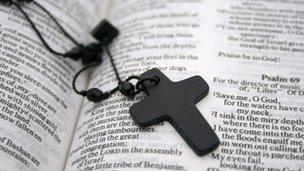HIV patients told by Pentecostal pastors 'to rely on God'
- Published

Some young HIV patients are giving up their medicine after being told by Pentecostal Church pastors to rely on faith in God instead, doctors warn.
Medical staff told the BBC a minority of pastors in England were endangering young church members by putting them under pressure to stop medication.
Healing is central to Pentecostalism, a radical belief in the power of prayer and miracles.
But one pastor denied people would ever be told to stop taking their medicine.
The Children's HIV Association surveyed 19 doctors and health professionals working with babies and children in England; its members had reported hearing anecdotal evidence of HIV patients deciding to stop taking their anti-retroviral drugs because their pastors had told them to do so.
Among 10 doctors who said they had encountered the problem in the last five years, 29 of their patients had reported being put under pressure to stop taking medicine and at least 11 had done so.
The doctors and health professionals reported a variety of cases:
- Some said they had dealt with parents who felt under pressure to stop giving their young children their HIV medicine - and some had actually done so
- Others were breastfeeding mothers with HIV who refused the medicine that would stop the virus being passed onto their babies
- Some were young people, making the decision for themselves
The healthcare workers also reported that some patients had been told by their pastors they would be healed by prayer or by drinking blessed water.
'Miracle cure'
Sixteen-year-old Oliver (not his real name) said he was told by a pastor to swap his HIV medicine for a plastic bottle containing water that would heal him.
He said many others had come under the same pressure.
"I've been to other churches where... the pastor stands forth there, and he says 'come take this water... if you drink it for this certain amount of days, you are going to be healed'," he said.
Later, after his mother had experienced what he believed was a miracle cure, Oliver stopped taking his medication, and his condition quickly deteriorated.
He has since gone back on his medication and said he believed he needed to combine his drugs with his belief in faith healing.
Dr Toni Tan, a consultant paediatrician, said some Pentecostal pastors were endangering the lives of sick followers.
"It's my view that it's very wrong for faith leaders to actively encourage their congregations to stop taking their medication... it will lead to their deaths."
Pentecostals and other Christians see healing, like speaking in tongues, as a sign of the presence of God.
Pentecostal pastor Stevo Atanasio, from the East London Christian Church, said that among his congregation, blind people had recovered sight, deaf people had heard again, and what were considered terminal illnesses had been cured.
"We don't say to people 'don't take your medication don't go to the doctor'. I mean we never say that," he said.
"But we believe that the first healing comes from inside, it's a spiritual healing. Some people are hurt, they have broken hearts. If you are healed from inside, then you are healed from outside as well."
'Avoid culture clash'
Pentecostalism is booming. The number of Pentecostal churches in London, for example, has doubled since 2005.
The overall number of incidents of HIV patients being told to give up medicine is thought to consist of a minority of churches and a small group of people.
But the Rev Israel Olofinjana, who is a former Pentecostal pastor and now a Baptist minister, said he had seen it happening.
"I've heard languages like that - 'put your trust in God, don't put your trust in medicine'."
He said many of these churches served migrants with an exalted view of the authority of pastors.
"Within the context of African churches, if you're coming from a culture where the pastor is like your fathers or mothers, like your community keepers, the word of your pastor becomes very important," he explained.
"It becomes very significant... there is a minority who say 'because God can heal absolutely... what's the need for medicine?'."
Dr Steve Welch, who is chairman of the Children's HIV Association, said it found it difficult to engage with the faith leaders of churches where healing was an integral part of the worship.
"We need to stay engaged with the families and understand that... their faith is an important part of the support they get in their condition, and engage positively with them and not make it a clash of cultures.
"I think it's about engaging with the pastors and faith leaders who are giving this advice because that's how we will actually address the root of the problem."
- Published15 August 2013
- Published3 July 2013
- Published24 September 2012